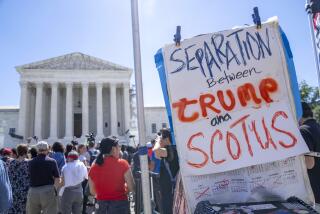Law Allows for 2 Kinds of Immunity
- Share via
WASHINGTON — G. Robert Blakey did not need Monica S. Lewinsky’s attorney or any other lawyer to tell him about “transactional immunity.” He wrote the law on it.
Nevertheless, the former Senate chief counsel seemed surprised when he heard Plato Cacheris--a chief attorney for the former White House intern--use the adjective “transactional.”
What that translates to in layman’s terms is “full” or “complete.” And what that means for the 25-year-old Lewinsky is that if she testifies truthfully to a federal grand jury here, she will not be prosecuted for her role in the President Clinton-Lewinsky matter that has engulfed much of Washington this year.
Since Blakey helped Congress draft and codify federal immunity legislation 25 years ago, there have been basically two kinds of legal protection.
The most widely applied is “use immunity,” in which a potential defendant is safeguarded from having his own testimony being used against him. But “transactional immunity” clears the decks for Lewinsky ever being charged in the matter.
“She continues to be liable if she commits perjury,” said Irv Nathan, a former associate deputy attorney general now in private practice.
“But apart from that, she has no liability from what’s happened in the past. It’s a very big deal for her.”
Blakey, now a law professor at the University of Notre Dame, said transactional immunity means that Lewinsky will not be prosecuted for any testimony that she gives to the grand jury regarding matters under investigation.
It is the most protective type of immunity that can be granted to a witness, he added.
He noted that John W. Dean III, presidential counsel in the Nixon administration, testified before Congress during the Watergate scandal under a “use immunity’ agreement that he would not be prosecuted for what he divulged.
However, the special prosecutor’s office had independently gathered evidence of Dean’s involvement in the Watergate cover-up, and he eventually pleaded guilty to obstruction of justice and defrauding the United States. He was sentenced to one to four years in prison, and was released after serving four months.
In contrast, Lori Fortier, a Kingman, Ariz., mother who knew in advance about the Oklahoma City bombing, was given blanket immunity in return for her testimony both to the federal grand jury in Oklahoma and during the trial of bomber Timothy J. McVeigh.
In the Lewinsky case, Blakey said, her attorneys and those with the independent counsel’s office most likely reached a written agreement on what she would testify to and the promise from prosecutors that she would not be charged with any offenses as long as she testified completely and truthfully.
“It’s a bargain,” he said, for both sides.
(BEGIN TEXT OF INFOBOX / INFOGRAPHIC)
2 Types of Immunity
* Transactional: Rarely offered, it is the type granted to Monica S. Lewinsky. It promises full protection from being prosecuted over any subject about which she gives testimony. She can be charged only if prosecutors believe she has committed perjury by failing to testify fully and truthfully.
* Use: Protects witnesses only from having their own testimony used against them in a prosecution. He or she could still be prosecuted through other means.
More to Read
Sign up for Essential California
The most important California stories and recommendations in your inbox every morning.
You may occasionally receive promotional content from the Los Angeles Times.














